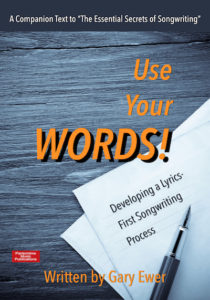These days you might be listening to Handel’s “Messiah,” and even if you don’t know that work, you no doubt know his “Hallelujah Chorus” which ends the second part of the oratorio. “Messiah” is a lengthy work consisting of fifty-three movements, and listening to the entire piece will take you more than two hours. (Most performances will eliminate a few movements.)
What often doesn’t get mentioned about “Messiah” is that Handel completed the writing of it in a mere twenty-four days. Mind-boggling! If any of us were asked to write fifty-three songs in twenty four days, we’d be more than a little intimidated, and I think it’s fair to say that most would fail that challenge.
 If you’re ready to discover how great songs really work, you need “The Essential Secrets of Songwriting 10-eBook Bundle.” These are manuals that thousands of songwriters are using. Comes with a Study Guide to show you the way through all the materials.
If you’re ready to discover how great songs really work, you need “The Essential Secrets of Songwriting 10-eBook Bundle.” These are manuals that thousands of songwriters are using. Comes with a Study Guide to show you the way through all the materials.
When the creative juices are flowing, it’s exciting. If you start and finish a song on the same day, you feel that you’ve achieved something worth bragging about. But what do you do when, for reasons you just can’t identify, you can’t finish anything you start?
The Main Reason the Creative Process Stops
Are you the kind of songwriter that finds it easy to start a song, but hard to continue? There can be any number of reasons why the initial burst of creativity that gets you starting a song seems to quickly evaporate.
But most of the time, the reason for being unable to finish a song comes down to this: you aren’t applying your understanding of the structure of music to this new fragment you’ve just written.
There may be no less inspiring word to a creator of music than the word “structure.” But being aware of how good music works is the key to turning your songwriting frustrations into songwriting success.
Sometimes when you’ve written a fragment of a song, the best way forward is to stop for a moment, think about that bit you’ve just created, and then ask yourself this important question: Where in my song should this fragment live?
Is it a bit of chorus hook? Is it the start of a verse? Is it better thought of as something that could work as a bridge after the chorus? Identifying what it is you’ve just written is a vital part of how to proceed.
But how do you know where in your song the fragment you just wrote works best? That’s where an understanding of the structure of music plays such a crucial role. It is, in fact, exactly why I wrote “The Essential Secrets of Songwriting”, and all the other eBooks I’ve written: to help you understand the structure of good music.
And no matter what genre you call your own, you will know:
- Verses tend to be lower in pitch than choruses.
- Verse melodies tend to be slightly more rhythmically-active than choruses.
- Pre-choruses tend to move upward in pitch and musical energy, helping the verse connect more successfully to the chorus.
- Verse lyrics tend to be more narrative while chorus lyrics tend to be more emotional.
- Bridge sections stand out from the chorus by either heightening musical energy, or (in the case of energetic songs) might bring musical energy down as a kind of temporary contrast and “relief.”
And I could go on. The more you listen to good songs in your genre, the more you get an idea of how structure plays a vital role in their success.
How To Keep Going
So if you’re writing a song, and you get stuck, the first thing you need to do is to stop, and think about what you’ve just written. And ask yourself, “Where does this fragment really belong?” If it’s a chorus hook (it often is), is it written high enough in pitch that it sounds like a chorus?
If it’s too low, change key and move it higher. That one fix may help the creative juices to start again as you’ll hear new energy surge forward. If it’s the verse you’re now trying to write, keep it below the range of the chorus.
If you feel your song needs a bridge, try improvising higher in pitch than the basic range of your chorus, and see where that leads.
The More You Listen
And another final bit of advice: the more you listen to good songs in as many genres as possible, the more your brain understands how the basic structure of music works, and the more easily your songwriting process kicks into gear.
If you get frustrated every time you try to write a song, and everything grinds to a halt soon after you start, the best next step is to simply stop. Take a breath, feel good that you’ve got something written, and then slowly apply your understanding of the structure of good music to your songwriting process.
 Written by Gary Ewer. Follow Gary on Twitter.
Written by Gary Ewer. Follow Gary on Twitter.
 If you’re trying to make your lyrics a much more important part of your songs, you need to read “Use Your Words! Developing a Lyrics-First Songwriting Process.” It’s part of “The Essential Secrets of Songwriting 10-eBook Bundle”, and right now, it’s FREE.
If you’re trying to make your lyrics a much more important part of your songs, you need to read “Use Your Words! Developing a Lyrics-First Songwriting Process.” It’s part of “The Essential Secrets of Songwriting 10-eBook Bundle”, and right now, it’s FREE.











Hi Gary, hope you are well and staying safe. Thank you for consistently providing us with very helpful advice.
I have no issue with determining the structure of a new song that I start writing and can typically complete the melodies for each section rather quickly. My problem is that after I’ve composed a melody my process comes to a halt when I try to write some lyrics for the melody. I wouldn’t say (if I can say so myself) that my lyrics are weak and I’m always happy with them once I do figure them out but I feel like it takes me way too long to complete my songs because I can sometimes spend up to a month agonizing over the lyrics.
Do you have any advice on how I could speed up the lyric-writing process? I know it’s important to take your time sometimes but I’m trying to start a songwriting career and hoping to get hired to write for someone so I figure that being able to work quickly will be important.
I have 10 songs in the process of being copyrighted and I’m working on the next 10 right now. Then I have to figure out how I go about pitching my songs to people. I was wondering if you have knowledge on the business side of things as well and could provide me with some advice on to how to pitch my songs to people as I have no idea how to do that exactly. If not then that’s fine, any advice about how to speed up my process will be much appreciated.
Thanks again for all the great work and keep it up. Stay safe.
Hi Matthew, I’m not sure if Gary has written an article about it before, but something that has helped me personally with the same struggle you have is:
Make
Interesting
Word
Lists
And draw your lyrical ideas from them by combining words, themes, ideas, etc. that stand out to you. How do you make the lists and how many words? I can’t recommend a minimum or maximum, but I can recommend going through your days and saving words to a notebook that are:
-based on human behavior and emotional attitudes
-dynamic, action verbs
-concrete imagery and characters
A good exercise to get you started is take a few of your favorite song lyrics and highlight all the nouns, verbs, adjectives, etc., and copy those words (leaving out all the linking articles such as “is,” “the,” “a,” etc.) to a separate list. Do this with a few more songs and now you can start experimenting with your own unique ideas coming from those words. Over time you’ll have a wider and diverse pool of ideas and lines you could potentially match to music as you’re writing, etc., which will reflect your own unique personality. This has helped me with writer’s block tremendously!
Give it a shot and I’d also like to hear Gary’s thought on it as well. Cheers 🙂